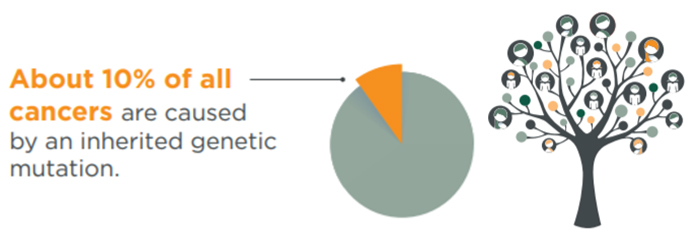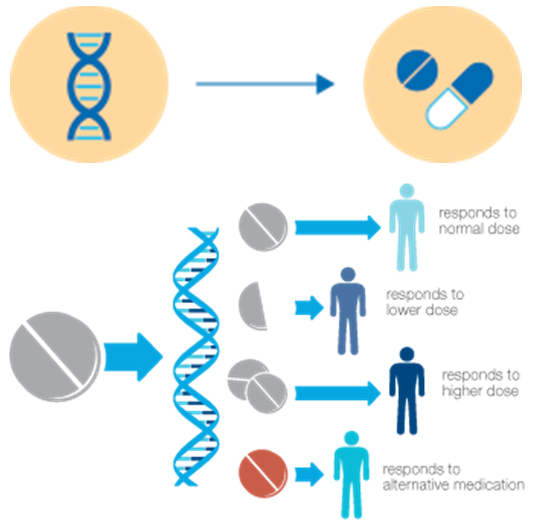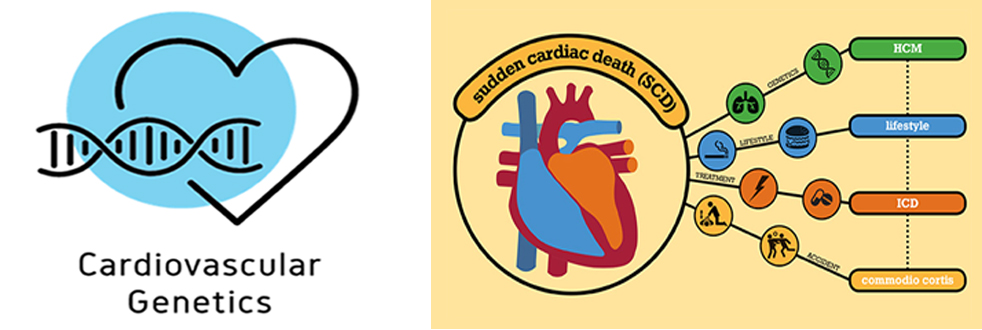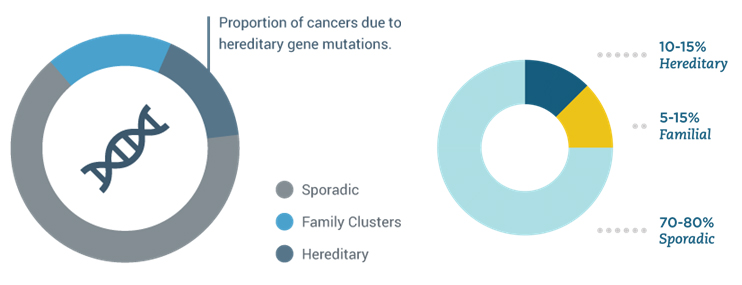Personalized genomic medicine
Genetic testing, along with your family health history, helps unravel your genetic risk for certain diseases so that we can work with you to create a proactive screening and prevention plan that is tailored to you.
Personalized genomic medicine is a way to improve your health using your family history, medical history, genetic information, and lifestyle
The four Ps of personalized genomic medicine are:
• Personalized: risks are uniquely yours
• Predictive: predicts the chances of developing certain disorders
• Preventative: based on genetic test results and specific lifestyle behaviours, offers healthy solutions to decrease disease risk
• Participatory: requires your involvement
Genetic Testing and Cancer
Genetic testing aims to identify the inherited gene mutations that are known to increase a person’s risk of developing cancer

Consider genetic testing if your personal or family medical history shows:
• Cancer present in multiple generations
• Multiple cancers in one family member
• Cancer at an earlier age than expected (usually under 50)
• Known gene mutation in the family
With genetic testing, we can:
• Understand your risk for certain cancers
• Develop prevention strategies
• Get the correct screenings
• Create a more personalized treatment plan if you are diagnosed
• Help other family members if they are also at risk
Genetic testing
• Increased surveillance can identify a cancer at its earliest, most treatable stage.
• Certain medicines can prevent cancer from developing (“chemoprevention”).
• If desired, surgery can significantly reduce risk.
• Genetic information can qualify you for participation in clinical trials or research studies

Pharmacogenomic care
• It is the process of analysing patients’ genetic codes to see how their bodies will metabolize and respond to certain medications.
• Pharmacogenomics helps doctors make the best decisions regarding the drug dosage
• The right drug, at the right dose, at the right time
Gene-powered Prescription
The right drug, at the right dose, at the right time. This is the power of pharmacogenomics.

Genetic Cardiac Care
• Heart disease is a leading cause of death worldwide and often runs in families.
• Certain heart conditions are caused by a single harmful DNA variation (or mutation)
• More than 1 in 200 people have an inherited form of heart disease, but most don’t know it.
• Geneticist can help you understand your family’s heart health.
• Genetic Testing for the Cardiomyopathies
• To identify a disease-causing mutation in those at-risk family members who have little or no evidence of disease
• Increased clinical surveillance
• Treatment interventions - can prevent, delay or treat almost all of the morbid or mortal aspects of the cardiomyopathies
• Genetic testing can help save lives.


Genetic Cancer Care
• 5 - 10% of all cancers are hereditary (cancers passed down through families via their genes)
• Genetic testing can help you
• Understand your risk for certain cancers
• Develop prevention strategies
• Get the correct screenings
• Create a more personalized treatment plan if you are diagnosed
• Help other family members if they are also at risk

Breast Cancer Care
• Breast cancer diagnosed at or before age 50 years
• Ovarian cancer
• Multiple primary breast cancers either in one or both breasts
• Male breast cancer
• Triple-negative (estrogen receptor-negative, progesterone receptor-negative, and HER2/neu -negative) breast cancer, particularly < 60 years
• Combination of pancreatic and/or prostate (Gleason score ≥7) with breast, and/or ovarian
• Two or more relatives with breast cancer, one under age 50
• Three or more relatives with breast cancer at any age
• A previously identified BRCA1 or BRCA2 pathogenic variant in the family
Genetic Diabetes Care
• Prediabetes is NOT yet recognized or treated
• Transition of prediabetes to type 2 diabetes can be delayed or avoided
• Delay of Impaired Glucose Tolerance by a Healthy Lifestyle Trial (DELIGHT) study
• 41 SNPs indicating risk for type 2 diabetes with a prediabetic status
• 5 -10% of untreated prediabetic patients will develop diabetes each year
• 5 - 10% may convert back from the prediabetic status to normoglycemia
• Consult Geneticist to discuss your family’s diabetic health.
• Genetic markers can be determined early in life, an advantage compared to established risk factors
• Once identified, successful lifestyle intervention trials clearly show that diabetes may be delayed, if not prevented.
• Get yourself screened

Genetic Autism spectrum disorder (ASD) Care
• Severe neurodevelopmental and neuropsychiatric disorder
• Autoimmune neuropsychiatric disorders
• Prenatal maternal-fetal immune interaction affects the fetal brain development
• Both genetic and environmental factors
• Ultimate goal of genetic etiology - discovery of biomarkers for risk assessment, diagnosis, and prediction of therapeutic responses
• Early intervention in ASD can promote better prognoses, reduce secondary behavioral complications, and even induce normalization of brain activity
• Known genetic causes are identified in 20-25% of ASD
• There are no single predictable genetic markers for the development of ASD
• Get them screened

Genetic Kidney Care
• Chronic kidney disease is a major global health problem
• Estimated that CKD will have become the fifth leading cause of death by 2040.
• Chronic kidney disease is a complex heterogeneous disease; contributions from both gene & environment.
